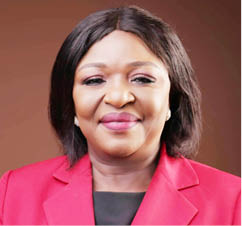Dr Charity Maina is the Co-Principal Investigator and Project Manager for the Ensuring Quality Access and Learning for Mothers and Newborns in Crisis-Affected Areas (EQUAL) project of the Institute of Human Virology, Nigeria (IHVN). In this interview, she speaks on the significance of maternal and child health, ways to address Rhesus factor incompatibility, as well as the impact of the EQUAL project on maternal health in conflict settings of the country, among others.
What is your assessment of the availability or access to maternal and newborn health services in Nigeria?
First of all, maternal health refers to the health of women during pregnancy, childbirth and the postnatal period, while newborn health refers to the health of babies in the first month of life. A healthy start in life has significant input to a person’s health and wellbeing during infancy, childhood and adulthood. It is important for both mother and newborn to be alive as they pass through this process.
I would say the availability is good, though it is not yet 100 per cent given the incidents of referrals necessitated by certain maternal and newborn health challenges and the different levels of care. This is because access to maternal and newborn health starts from the community to the primary healthcare facilities, and where there are issues, women are referred to secondary care facilities, which are bigger hospitals. If there are also issues at this level, the women are referred to the highest level of care, which is the tertiary hospitals. I would say we are doing well, though not yet there, but surely we are on track to getting there.
- 5 killed in Tiv, Fulani clash in Taraba
- New presidential jet: Obi urges FG to focus on alleviating Nigerians’ suffering
What is Rhesus factor ?
It is a specific antigen that is present on the surface of the red blood cells of certain people who are Rhesus-positive. Those who do not have the antigens are Rhesus-negative. The presence of the antigens on the surface of the red blood cells can affect pregnancy and health of newborns. Having this condition is not an illness. However, it becomes a problem when the condition is incompatible with the concerned couple. That is, one partner is Rhesus-positive and the other is Rhesus-negative. In this case, it becomes a health problem for the mother and child.
How does this incompatibility affect a pregnant woman and her child?
The concern arises when the Rhesus-negative mother carries a Rhesus-positive foetus, probably the Rhesus-positive foetus inherited it from the rhesus-positive father. This is Rhesus incompatibility. It means that during pregnancy, or at delivery, the foetus’ positive red blood cells can cross into maternal circulation, and since the Rhesus-negative mother does not have the Rhesus antigen, her immune system may recognise these as foreign agents and start producing antibodies against them. These antibodies develop more strongly in subsequent pregnancies so much so that they affect subsequent babies. The first baby or babies (twins) usually get saved, but the other babies get affected, causing death, abortions and many other complications.
Some women attribute childbirth losses to witchcraft. What is your assessment of the level of knowledge about Rhesus factor in Nigeria?
The women who attend antenatal clinics have more opportunities to get knowledge and information on the Rhesus factor through the comprehensive health talks provided. The health talks are a complete package of service that includes education, screening of blood and urine, etc. The education provides them with information on the Rhesus factor, what to expect and how to prepare for it. With this information and knowledge, women will not see complications caused by the Rhesus factor as the handiwork of witchcraft or anything diabolical. That is one of the benefits of attending antenatal care clinics.
What is your take on Rhesus factor testing before marriage, just like people do for genotype and HIV?
It is very important and it is good to know about the Rhesus factor. In Nigeria, our health-seeking behaviour is not so good. People visit the hospital only when they are sick. This should not be so. Occasional visits, as routine, to know your health status are helpful and can be life-saving. Knowing one’s genotype, HIV status and Rhesus factor before marriage are good things to do to prepare intending couples. It is a good way to go.
How is Rhesus factor addressed in pregnant women?
When pregnant women attend antenatal care, they are screened to rule out ailments including the Rhesus factor. For Rhesus factor, a laboratory test is conducted to screen the blood and cross-match to identify Rhesus-negative pregnant women. Women identified are counselled, treated and provided with information and education on what they should expect during delivery. They are informed to look out for certain signs in the newborns and quickly come to the hospital should they identify any. It is possible they may need to have their babies delivered in a secondary health facility to prevent complications.
Other prevention and treatment interventions include the administration of an injection of Rho (D) Immune Globulin around the 28th week of pregnancy and again within 72 hours after childbirth to mothers to prevent them from developing an immune response against Rhesus-positive foetal blood cells. This medication works by clearing any foetal Rhesus-positive red blood cells from the mother’s circulation before her immune system can react and create antibodies.
Also, early in pregnancy, all women are tested for their Rhesus factor. If a Rhesus-negative woman is pregnant with a Rhesus-positive baby, she is monitored closely throughout the pregnancy for any signs of antibody formation. At birth, if a newborn develops Rhesus-related hemolytic disease, treatment may include phototherapy for jaundice, exchange transfusions to replace the baby’s blood with Rhesus-negative blood, or intravenous immunoglobulin (IVIG) to reduce the level of antibodies attacking the baby’s red blood cells. By effectively managing Rhesus incompatibility through preventive treatments and vigilant monitoring, most serious complications associated with the Rhesus factor in pregnancy can be avoided. This has greatly reduced the incidences of severe cases of hemolytic disease of the newborn. Attending the antenatal clinic is key for all pregnant women.
The goal to increase access to essential obstetric and neonatal care and address specific complications is very important to maternal and newborns. One of the objectives of maternal and child health is to provide education on essential maternal care consisting of interventions that are most likely to reduce maternal and newborn deaths, and also promote early and regular antenatal care visits for pregnant women, including comprehensive health assessments, immunisation and health education. In addition, every delivery should be conducted with an attendant who has certification in the essential skills and the necessary supplies and equipment.
I would urge such women who have Rhesus factor incompatibility to visit the hospital to see their gynaecologist immediately for counselling, screening, monitoring and management.
Is Rhesus factor all about women?
The IHVN encourages male involvement at the antenatal care clinic. When men come with their wives to antenatal clinics, they will have the opportunity to acquire knowledge and information on the Rhesus factor that will eventually lead to positive attitudinal change. This way they can support their wives. Example, in the Northern part of this country, the men are decision makers, and they have a strong voice. When they listen and get the same information with their wives, they will be able to support their wives in getting the needed drugs; which are a bit expensive.
What is your advice to the government about Rhesus factor?
I urge the government to provide free drugs for use by Rhesus-negative mothers as it used to be in the past. Secondly, the government should encourage gender inclusion and women in decision making on accessing healthcare. Women who are at the centre of Maternal Neonatal Health (MNH) services should occupy the discussion table to participate in decision making on provision of MNH services.
What about the EQUAL project of IHVN?
The IHVN and the International Rescue Committee (IRC) are leading a research project in Nigeria called EQUAL. This research is critical in Nigeria where rates of maternal and newborn deaths remain among the highest in the world. The research aims to help generate evidence to advance the government of Nigeria’s efforts to address the shortage of midwives in rural and hard-to-reach communities by implementing the community midwifery programme.
The study is a five-year longitudinal assessment of the quality and gaps of the community midwifery education and practice. EQUAL is funded by FCDO for five years (July 1, 2021 to April 30, 2026. It is currently implemented in Nigeria, Democratic Republic of Congo (DRC), Somalia and Sudan. There are five arms or sub-studies, and Nigeria is participating in three (sub-studies 1, 4 and 5).
How has IHVN been involved in maternal health services across the country?
Maternal health services are already embedded in the services provided at the antenatal care. IHVN is working in different health facilities to provide these services. They have their staff in most of the hospitals or facilities to support the government in this aspect. IHVN, through the EQUAL project, is also conducting research on ensuring quality access for mothers and their newborns in conflict affected contexts like Yobe State. We are hoping that discussions of our findings will inform national midwifery education and MNH policy and guidelines change.

 Join Daily Trust WhatsApp Community For Quick Access To News and Happenings Around You.
Join Daily Trust WhatsApp Community For Quick Access To News and Happenings Around You.


